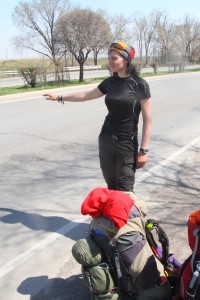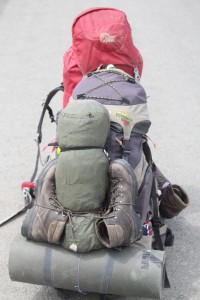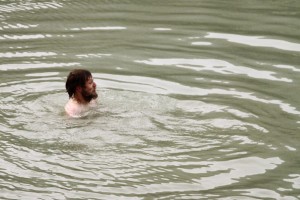Though the air is full of beautiful birds songs it is usually our screaming handwatch alarm that wakes us up in the mornings. 7AM and we start feeling the frost from the tent falling on our cold noses. I’ll admit, the first thoughts are not much different than of those in a warm bed back in Lithuania – you don’t really want to get out of the warm paradise.
Our morning is like the work of a swiss watch – everything is precise and clear beforehand. First, you put the frozen wet clothes. Then while our alcohol can stove is boiling the water for the tea in one of our aluminium bowls, the packing of our massive Snugpak sleeping bags takes place. Toilet, wash up and soon we are sitting in the tent for the breakfast. It is the most delicious when the cucumbers and all our fruit has not turned to ice over the night and we are eating real vegetables and not tomato icecream. With our cold fingers we finish packing the tent and the next moment we are putting the 25-30kg bagpack.
Normaly it is not long before the first car stops – if the place is right then ten minutes, half an hour and we are drying our gloves in the car. The workday has started. Adventures, new people, photos and everything else that we get while travelling from A to B.
Three hours after the sun has given up its powers to the moon (8-9PM) and we are getting ready for the night. Making the tents, rolling the mats and the sleeping bags. If possible making a fire as well. Another hour or so and we are laying down in tents with our bodies full of food and chatting about the day that has just quickly passed. Writing the diary/articles, making the next day plans and trying to close the eyes.
Hitch-Hiking
The happiest moments come when we manage to stop a truck. Big, long-distance and driving a bit faster then a horse pulling a cart. I think this is how our biggest distances and articles are made. As well as new ideas and dreams are born.
Our hitching does not differ much from everyones well known thumb lift at the side of the road. Still, at some place it is a thumb while in others (Iran, Greece etc.) simply a hand as it might be an offence. We are trying to stand at the highway entrances or at some exit of a roundabout where cars are driving slowly and there is some place for them to stop. If there is normal traffic, but in half an hour or more no one has stopped it might mean that the place is cursed or simply not good enough and we need to move on. It is funny, but even if the place is perfect some drivers still manage to stop in such a terrible way (the middle of a highway) that it not only makes it difficult for us to get in, but also gets every other passing driver mad. We don’t really use signs as it is usually quite convenient for us to stop any car as the driver might decide to give us a lift even if he is not going exactly that way or simply might explain something more about the roads that surounds us.
While on the road we always make sure that there is no scarf or sunglasses that hide our faces. Also, it is really important to put the bagpacks in front of us so that people would know we are not some serial killers but only some travellers looking for new experience.
First conversation with the driver is usually very simple. When the car stops we first ask its destination. If the person does not understand us, then we ask for how many kilometers it is driving and pointing to the long road we are facing. To save time and stuggle we also have a little tradition to make a little dictionary when entered a new country (food, road, home and other similar categories). Still it is funny how much one can communicate using only the body language.
- Where do you live? -Do you hitch hike yourself?
– What do you do for living? -Have a family?
…and soon the conversation flows itself. Usually the drivers are keen to tell more about their country/city. While passing some nice places lots of them stop and try to show their proudness of the land. If you are in Turkey, Azerbaijan or Iran – you might be lucky to be invited for a dinner or a stay at their home too.

Sunkvezimio vairuotojas braizo zemelapi ant saligatvio. Iranas. | Truck driver is drawing a map on the pavement. Iran.
Though there are lots of info about hitching, some our personal little habbits and rules came out only when being on the road. Being safe is the most important. Most of the drivers are at least wonderful, still, there are some that because of the lack of knowledge or simple bad deeds might get us into trouble. It is great that we can use Lithuanian language to discuss the situation, the necessary actions and none of them will understand a word. Still, if we can smell trouble (the driver is drunk, someone is asking for money etc.) we have our little hand gestures that would make one clear or another’s thoughts – eg. to stop immediatly.
Everytime we stop we never close all the doors before getting all the stuff out of the car as the driver might just drive away very easily. Also, one of us always stays awake and alert. It is important to watch the road as some drivers forget or do not understand which way we are going and what road we will take next, which is why we need to look for the signs ourselves. It is important to watch the driver not only because he/she might do something silly, but also not to fall asleep! After some 10 hours of driving it is necessary to keep its company so that it would not hit the steering wheel and drive off the road.
Even though we have some rules it is mostly the common sense and simple understanding that saves our arses.
Spendings.
Our budget is not of some ritch tourists, but more of two travelling nomads that have cash only for little food and visas. We can at most £6 to spend per day, including food, inventory and any necessary transport. After those first three months of travel (Europe, Middle-East and far Asia) we are proud to say that we managed to spend only some £4 per day even though we bought some equipment (mats, socks etc.), been to many touristic places and bought hundreds of kilograms of sweets. So we are sure it is possible to make it even cheaper. On the other hand, besides these spendings we have also had at least the same amount spent on visas. The bright thing of this is that Lithuanians need visas mostly in Asia and Africa, which means some big savings later in Americas.
Sleep
Places where we fall into our crazy dreams are as colourful as Uzbekistan’s national dresses. Mostly while in the Middle-East we are invited by locals which is their tradition and big joy to have a guest at their homes. If we are unlucky to be in some big city than it is CoutchSurfing that saves us as it is not always possible to camp at any park.
Of course, when we are not hosted by some people than we usually find a place to rest somewhere little further from the main road we are hitching. We can later come back pretty quickly in the morning. It is fantastic when we can camp somewhere at national parks or close to beautiful but remote objects like castles or churches. On the other hand it is not uncommon for us to sleep under the bridges or empty houses.
Food
The breakfast is seldom not boring – cheese, bread, some cucumber, few fruits and of course hot tea. Sometimes locals invite us to join them while eating and share something more afterwards – halva, nuts, honey etc. We start our day full as we don’t know when we’ll be able to find time for something more serious then a pack of nuts or a bar of chocolate. In the mornings we always try to eat much fruit and vegetables as it provides lots of quick energy for the day. Before hitting the road we swallow a few Vitamin C tablets so that the imune system is strong and no colds would chase us.
Because we are more or less vegetarians it is even more important to track what we eat and make sure everything is balanced. We don’t buy meat and only eat it if someone has prepared a meal for us, which is why we try to have at least some little nuts, fish or youghurt everyday. It is important to eat green stuff (spinach or kivis) as there is much of our needed iron. We try to drink much water as well. In some countries, like Iran, the water is safe to drink and you can use it straight from the tap. While in some other ones we have to use water purification tables not to catch diarehea.
In the evenings we usually get full so that it is not cold at night. We have some fast cooking crops that we use to make soups and other meals. Again, lots of people invite us to share something traditional and make our routine more colourful.
The idea of such food balancing is that we are not running a sprint, but rather a marathon, which is why we need to keep our energy reserves full and ready for everything. We do not want to look at the surounding world with starving eyes but to admire it and enjoy the travel.
Highiene
It is a common question that people ask ‘Where do we wash?’. The answer is very simple – everywhere it is possible. If we are not at someones house then it’s common to use some gas station or a museum toilet’s sink to wash our feet and hair. It should be much easier later in summer as addition to lakes and rivers there are beaches with showers and other facilities. While in winter we make use of snow and wash some things that way. Even some very energetic mornings start with snow showers.
We do the washing up everytime we are invited to some peoples place. Not many of them have washing machines so we have to wash most things with hands. A pair of socks or two and so far there are no problems with washing up.
Sport
Everyday in the morning we try to do some excercising and streching, especially for the back. It is because the weight we are carrying can have bad inpact later on. Also, it is always better to start a day full of energy.







